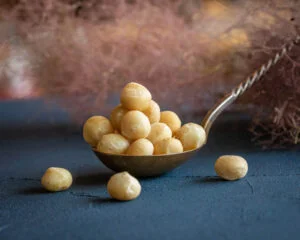Organic pecans
From 3.44€
There is probably no pair of nuts more easily confused than pecans and walnuts.
Firstly, they belong to different tribes and have different flavour; pecans are sweeter and buttery, while walnuts have a more robust, earthy flavour. In terms of appearance, pecans are generally more oval and reddish-brown, while walnuts are rounder and have a lighter, beige shell. Furthermore, the culinary uses of the two nuts differ, with pecans often used in sweet dishes such as cakes, while walnuts are mostly used in savoury dishes such as salads and pesto. Finally, their nutritional profiles differ, as pecans tend to be higher in fat and calories while walnuts are higher in omega-3 fatty acids.
Pecans are also known as pecan nuts. Their rich, buttery flavour and natural sweetness make them a delicious and filling snack.
Walnuts.lt on the health benefits of pecans:
- potent antioxidants, inhibiting many of the harmful substances that lead to cancer risk
relieves hunger and boosts metabolism, so it is recommended for weight loss; - lowers elevated cholesterol levels;
- reduces the risk of gallstones;
- slows down age-related neurodegeneration of muscles;
- reduces the risk of heart disease;
- An excellent source of vitamin B1, which is deficient in fatigue, muscle weakness, headaches, memory impairment, numbness of the elbows, tingling, loss of appetite, heart failure and loss of appetite;
- An excellent source of zinc, which is essential for human growth and sexual maturation, and also stimulates the prostate and helps wounds heal faster;
- are rich in omega-6 fatty acids (up to 2 times more than walnuts), which are important for brain membrane function and brain activity, normal skin function, immunity and blood clotting;
- Beneficial for the hair by reducing hair loss and stimulating hair growth.
Vitamin A – 56 IU
Vitamin B1 – (57%) 0,66 mg
Vitamin B2 – (11 %) 0,13 mg
Vitamin B3 – (8%) 1,167 mg
Vitamin B5 – (17%) 0,863 mg
Vitamin B6 – (16 %) 0,21 mg
Vitamin B9 – (6%) 22 μg
Vitamin C – (1 %) 1,1 mg
Vitamin E – (9%) 1,4 mg
Vitamin K – (3%) 3,5 μg
Calcium – (7%) 70 mg
Iron – (19%) 2,53 mg
Magnesium – (34 %) 121 mg
Manganese – (214 %) 4,5 mg
Phosphorus – (40%) 277 mg
Potassium – (9%) 410 mg
Zinc – (48%) 4,53 mg
NOTE. The information contained herein should not be construed as a recommendation for treatment or other health issues. We encourage you to make personal decisions about your personal health, taking into account a wide range of sources of information.
Organic pecans 100 % organic
Energy 695 kcal / 2866 kJ
Fat 67,6 g
- of which saturates 6,3 g
Carbohydrate, excluding fibre 5,2 g
- of which sugar 4,4 g
Fiber 10,1 g
Protein 11,5 g
Salt 0,01 g
Store in an airtight, dry, cool place protected from direct sunlight.


